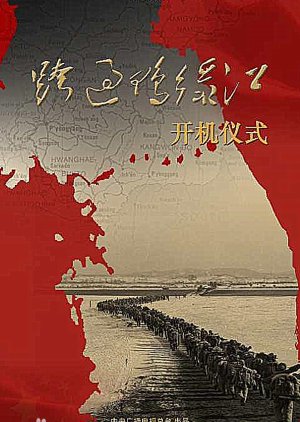Deputy company commander Yan Zhigang encouraged everyone to continue digging fortifications. With the Soviet Union’s presence in the Sino-US armistice negotiations, the truce negotiations between China and the United States were finally set. The United States sent five negotiators. For South Korea, Truman believed that they did not need to participate. On the issue of North Korea and South Korea, Li Qiwei proposed to let Bai Shanye, who is proficient in Chinese and English, participate in the negotiation. Truman emphasized that the negotiations only talk about the military aspect, and that political interests cannot be compromised. He believes that both China and North Korea have not negotiated at the international negotiating table, and they will win the negotiations at one time.
Zhou Enlai looked at the negotiation declaration issued by Li Qiwei with a cold face. This meant that he wanted to talk and save face if he couldn't win. Mao Zedong knew that this negotiation would never be easy, and he was very keen on the negotiator Mao Tue, and it hit it off. President Peng told Deng Hua and Xie Fang that the Central Committee had decided to send them two to participate in the armistice negotiations. Xie Fang pointed out that they had no experience in negotiations and needed a backbone to lead the way. Mr. Peng joked about going there, but Deng Hua and Xie Fang made a joke. Chairman Mao has appointed the leader of the negotiation team. Looking at the name written by President Peng, the two said that they felt at ease. Hong Xuezhi is not in Peng Zong who wants Deng Hua and Xie Fang to play chess with him, but the two of them have found excuses to want to go. Peng Zong and Hong Xuezhi usually play double regret chess, but he can't play this chess with Peng Zong. . In the end, Deng Huaneng had to stay with him to play chess. Xie Fang found an excuse to slip away but was arranged by Mr. Peng to chop the firewood.
The negotiator selected by Chairman Mao was Li Kenong. He understood that the U.S. imperialism proposed negotiations at this time solely for their global interests. The sincerity of the negotiations was greatly compromised. China would do its utmost sincerity but would not be afraid of war. Zhou Enlai proposed that both the battlefield and the negotiating table should be prepared. Li Kenong and Qiao Guanhua will go to the negotiating table together to confront the American imperialists. Li Kenong's physical condition is getting weaker day by day. Asthma and heart disease are a great drag on him, and his vision is also very degraded. Mao Zedong took out his magnifying glass and gave it to him, and told him to set off low-key. Li Kenong returned home to visit his father who was already seriously ill. He told his wife Yingzi that he would help him share more after the negotiation. Yingzi understands her husband's responsibilities and mission. She also packs up Li Kenong's clothes and tells him to take care of himself who is already sick.
Li Qiwei held a cocktail party inviting hundreds of negotiation assistance experts sent by the United States and introduced the negotiators sent by the US this time. The negotiators stood on the stage with wine glasses and arrogantly said that they would defeat China at the negotiating table in ten days. Bai Shanye, who arrived late, looked at the complacent negotiators and reminded them that they should know more about their opponents. The US representative even asked Bai Shanye whether North Korea and South Korea use the same language, which made Bai Shanye almost know how to respond.
Li Kenong faced the soldiers of the two platoons of sergeant police, patiently talking to them about the mission of being a sergeant police. They must not shoot unless the United States fires first in the negotiation area. The secretary of the negotiating delegation, Chai Chengwen, reported to Li Kenong that the US negotiators believed that the red flag was the national flag of China, but they wanted to participate in the negotiations with the white flag. Li Kenong knows that white represents peace in the West, but this also happens to show that the United States has not made any preliminary preparations at all, just as they rashly attacked North Korea.
Sure enough, the white flag hung on the American car the next day caused a discussion among a group of reporters. Looking at the white flag on the car, Bai Shanye was very helpless. Only then did the representative of the United States understand that white means surrender in the East. At the beginning of the negotiations, the North Korean representative put forward his own proposal. First, the two sides must cease fire at the same time, and the second sides must simultaneously withdraw from the 38th line and 80 miles, and the troops of the three other countries must immediately withdraw from North Korea. Deng Hua said that these three proposals should be the starting point for the truce and talks. The US representative, General Joe, believes that the proposal to withdraw from North Korea is a political issue rather than a military issue. The U.S. made nine suggestions. One requires the two sides to agree on the negotiation agenda, and the other requires knowing the exact location of the prison camp and allowing the Red Cross to visit. Both of these proposals have left the Chinese and North Korean representatives silent.
Zhou Enlai adopted "do what you should do, stop what you can't stop" as the guiding spirit of the negotiation work. Li Kenong proposed that the negotiation is the same as making a fuss. He pointed out at the first negotiation team meeting that their negotiation team exists in secret. He and Qiao Guanhua are called captain and instructor respectively. With the intelligence he has, the United States has transferred nearly a hundred experts from all walks of life, and diplomacy is no small matter. Li Kenong requested that the contents of the negotiations must be sorted out in detail every day, and the negotiations must be analyzed and summarized into a report, and then he will analyze and write out the next step of the negotiation countermeasures, all of which must be completed by 3 in the morning. Li Kenong told everyone that the negotiations were actually carried out under the direct command of the chairman and the prime minister, and that they must operate with high intensity and send the report to Beijing for determination as soon as possible, and complete the glorious mission assigned to them by the party and the state.
After reviewing the U.S. proposal, the North Korean representative believed that the payment was logical and repetitive. The three proposals made by the DPRK already contained them and reminded the U.S. that it cannot circumvent key issues. Joe pointed out that the battle line has now reached the north of the 38th parallel, and it is unreasonable for the U.S. military to retreat south of the 38th parallel. He even privately introduced reporters into the venue and unilaterally suspended the negotiations. Li Qiwei proposed to delimit a zone in the negotiation, which is to cover up his responsibility for preventing the negotiation. Mao Zedong pointed out that if the U.S. side agrees not to entangle the question of the location of the negotiation and the reporter, all the excuses of the U.S. must be dispelled to get the initiative.

